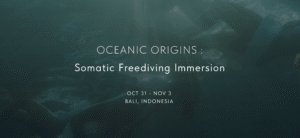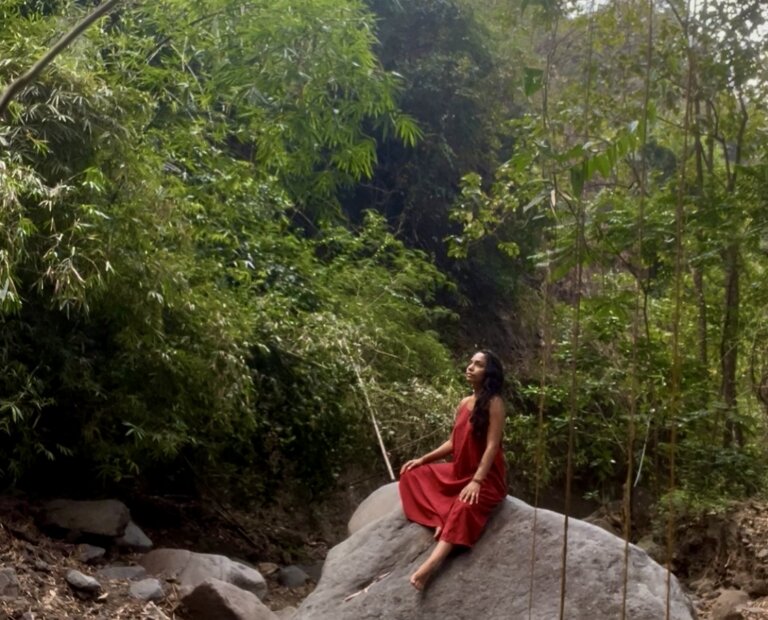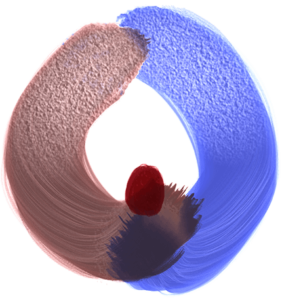Freediving as Ancient Memory
There is something deeply familiar about holding our breath and slipping beneath the surface. Freediving may appear to be a modern sport, but at its core it awakens an ancient memory. Each dive is less about conquering depth and more about remembering who we are — beings shaped by water, born of water, and forever tied to the sea.
The Sea Nomads
Across Southeast Asia, sea nomad peoples such as the Bajau, Moken, and Sama have lived in close relationship with the ocean for generations. They learned to dive for minutes at a time, hunting, gathering, and navigating with an intimacy few of us can imagine today. Science shows that some of them even carry unique physiological adaptations: larger spleens for storing oxygen-rich blood, or eyes that adjust underwater to see clearly. For them, the ocean is not a distant wilderness — it is home, livelihood, and cosmology.
Their capacities are not alien to us. Our own bodies still echo with this watery ancestry. The salt in our blood, the amniotic fluid that held us before birth, the mammalian dive reflex that slows our heart rate as soon as our faces touch water — all remind us that we too are aquatic creatures at our core. Freediving simply reawakens what the body already knows.
Modern life, however, often pulls us away from this knowing. Many of us live far from coasts, attuned more to industrial clocks than to tides. We fear the deep, the unknown, even the sensation of being without breath. In losing touch with the ocean, we lose touch with a vital part of ourselves.
Freediving as Somatic Return
Freediving offers a path of return. Each dive invites surrender — trusting breath, trusting body, trusting the vast embrace of water. It becomes less about athletic performance and more about nervous system regulation, softening into presence, and finding belonging in something larger than ourselves. The practice is somatic, psychological, and spiritual all at once.
In remembering the sea nomads, we remember not just their cultures but a shared human lineage. To dive is to honor their wisdom, to bow to the ocean as teacher, and to recover an ecological belonging that modernity has obscured.
When we descend, we remember: the breath as a bridge, the body as oceanic memory, the sea as kin. And in remembering, we begin to care again — for the waters that birthed us, and for the world that still depends on them.

Oceanic Origins: Somatic Freediving Immersion this Oct 31 – Nov 3
Oceanic Origins is an invitation to reconnect: where your body becomes a guide, the ocean a mirror, and each dive a living ritual of renewal. Rediscover your aquatic nature in a transformative 4-day freediving immersion designed for beginners. 𝟰–𝗱𝗮𝘆 𝗳𝗿𝗲𝗲𝗱𝗶𝘃𝗶𝗻𝗴 𝗶𝗺𝗺𝗲𝗿𝘀𝗶𝗼𝗻 𝗱𝗲𝘀𝗶𝗴𝗻𝗲𝗱 𝗳𝗼𝗿 𝗯𝗲𝗴𝗶𝗻𝗻𝗲𝗿𝘀. More than a skills course, this is a soft return to the body’s innate intelligence through somatics and our shared oceanic lineage through freediving.
Join us and make your booking here
References:
- Research on the Bajau Laut people and enlarged spleens (Ilardo et al., Cell, 2018)
- Marshall McKusick’s The Bajau Laut: Adaptation, History, and Fate in a Maritime Fishing Society of South-Eastern Sabah
- Ethnographies on the Moken (e.g., Jacques Ivanoff’s The Sea Gypsies of Thailand)
- Documentaries: The Last Sea Nomads (Al Jazeera), Jago: A Life Underwater (Indonesia)
- Freediving cultural history sources:
- William Trubridge’s writings (world champion freediver) often reflect on ancestry
- UNESCO reports on intangible heritage in maritime cultures











